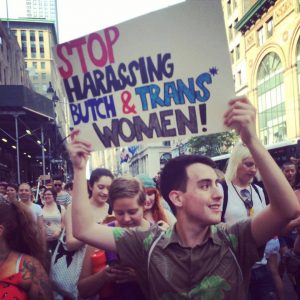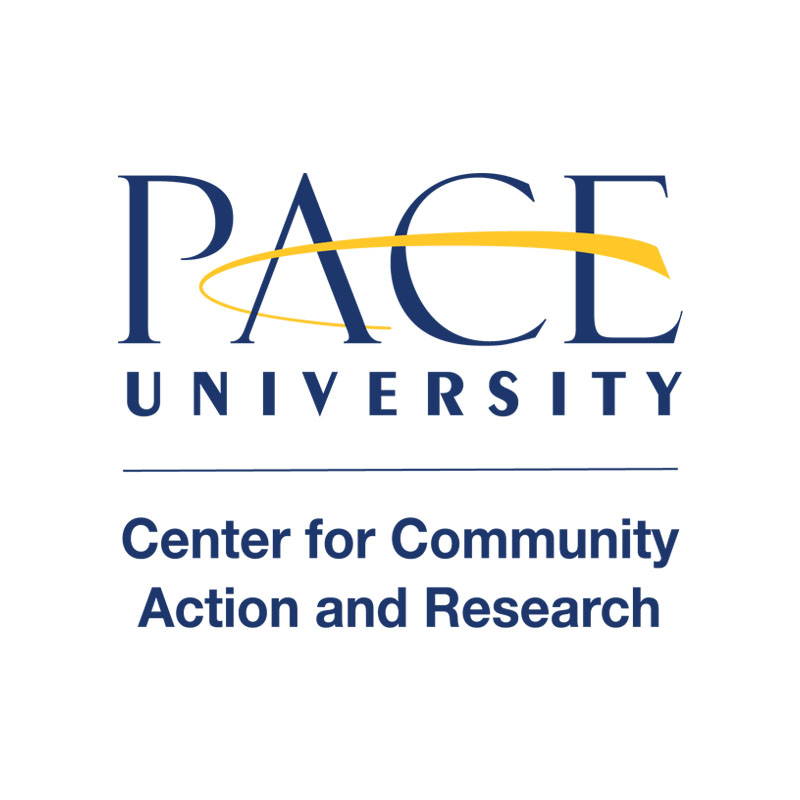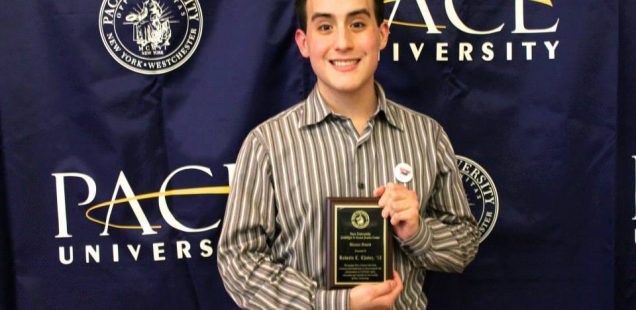
ALUMNUS ACTIVIST SPOTLIGHT: ROBERTO CHAVEZ ’13
Roberto C. Chavez (“Berto”) is an educator, activist, and poet with a background in history, theatre, and social justice. Roberto has a love for letter-writing and journaling, as well as examining how we document the past and present, how do we tell stories and pass them on, and which narratives make up our collective history.
As a native New Yorker with Ecuadorian immigrant parents, the rich, multicultural identity of the city has always impacted how he has viewed the world.
As an educator at the New York Transit Museum, he leads tours, workshops, and programs with accessibility in mind. He is also a co-facilitator for Subway Sleuths, an award-winning after-school program for students on the Autism spectrum. Working with children, families, and students is a joy in his life.
Formerly, Roberto worked as an educator at the Lower East Side Tenement Museum and as a docent at St. Paul’s Chapel. When he is not teaching, he is a volunteer hotline crisis counselor for the Anti-Violence Project, which serves LGBTQ and HIV-affected communities. At Pace, he was a History Major, Latin American Studies Minor, New York City Studies Minor, Queer Studies Minor, and Peace and Justice Studies Minor.
As a young gay Latino man, I was able to find a community at Pace and find my voice, and that encouraged me to help others do the same.
You’re an outspoken feminist and advocate for LGBTQ rights. How does feminism play a role in your personal, work, and activism life? Is there a specific branch of feminism that you identify with?
Feminism plays a constant role in my activism and my personal life, as it should!
While I do not identify with a specific branch of feminism, I always seek to expand my knowledge with articles and work that are, of course, queer-friendly and trans-inclusive. I openly identify as a feminist and remind fellow gay men that we should challenge sexism and misogyny, especially within our community and when fighting for equality.
I definitely believe in the popular slogan that “The Personal is Political” and believe in the interconnectivity of our experiences and the power of sharing those stories. One example I immediately recall having a strong impact on me is Audre Lorde’s poem “Need: A Chorale for Black Women’s Voices,” which I found one day in the Pace Library.
Tell us a little bit about your work history as a former museum educator at the Lower East Side Tenement Museum and your current position at the New York Transit Museum.
Since graduating from Pace University in 2013, I have worked as a educator at two different institutions: the Lower East Side Tenement Museum and the New York Transit Museum.
At the Tenement Museum I told the stories of the immigrant families that lived in 97 Orchard Street in the late 19th century and early 20th century. I led the tours: Sweatshop Workers, Hard Times, Irish Outsiders, and Meet Victoria – as well as the school group programs for grades K-12. In the recreated, historic apartments, visitors got to listen to immigrant families’ stories, engage in facilitated discussions, and connect immigrant narratives to the present.
Having visitors that were locals, domestic tourists, and international tourists really opened my eyes to the importance of sharing history. When xenophobia and racism towards immigrant groups is on the rise, the need for empathy is great.
Has working at those places inspired your personal activism? Or did it challenge your beliefs?
At the New York Transit Museum, I lead tours and programs for school groups exploring the city’s transportation history and the role of the subway in the growth of the five boroughs. Since we are located in an actual, decommissioned 1936 subway station, the museum lends its interesting and unique location to exciting programs!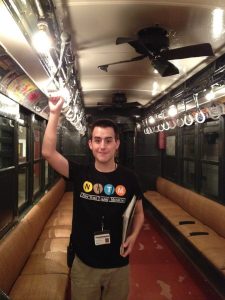
I am one of the educators that teach students with special needs. A program I lead for students and adults with developmental disabilities is called Ready to Ride, which is an introduction to independent subway travel. I believe it is a very important program that the museum offers, since it is a safe environment for classes to come visit and learn in.
Each semester on Thursdays I work alongside a special education teacher and a speech language therapist at Subway Sleuths!
Our award-winning Subway Sleuths is an after-school program for students on the Autism spectrum. Using a strengths-based approach, we have the opportunity use the students’ shared interest in trains and transit as a means to encourage social interaction between peers and to develop social skills. It is one of my favorite programs at the museum and it is an absolute joy to see how the sleuths grow over the semester!
I have met wonderful students with Autism, parents, teachers, and paraprofessional educators through the museum and it is incredible to see how they advocate for disability rights, inclusion, compassion, and respect.
My work at the Transit Museum is very rewarding. I love my job there for the numerous reasons already mentioned, as well as the relationships I’ve built with visitors, school groups, my colleagues, and my supervisors.
By listening to others’ stories, we share the weight of the stories. They stay with you. Inspire you. Move you.
At CCAR I found my love of being volunteering grow. The chance to come together to work towards a cause. Volunteering is giving back, engaging, connecting, eye-opening, mind-opening, and empathy-building.
How do you think your experience as a Pace student helped shape you to be the activist you are today?
Pace University played a tremendous role in helping shape me into who I am today.
As a young gay Latino man, I was able to find a community at Pace and find my voice, and that encouraged me to help others do the same.
Prior to the newly-founded Queer Society, the LGBTQA student organization on campus was Stonewall Coalition. I joined Stonewall back when there was no LGBTQA & Social Justice Center (or Lavender Ladies: Women Who Love Women).
They fought to make Pace an institution where students can feel welcome. When I joined the E-Board I met Aiden Nguyễn, who soon later became my boyfriend. He joined Stonewall’s E-Board and later became its President. Together with the E-Board we had weekly meetings, movie nights, co-sponsored the Coming Out Day Fair, co-sponsored the Breaking the Silence Fair, and other events.
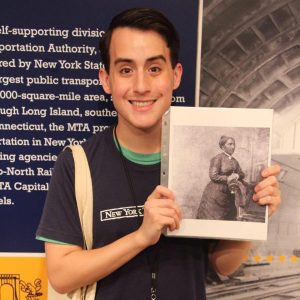 In my junior year, when I was Stonewall’s Vice President, I realized during our weekly meetings that I couldn’t help answer all of the first year students’ questions. Part of it was because I never dormed at Pace and was always a commuter from Queens. But I still wanted to help students navigate college life. So I decided the next logical step to being there for incoming students was by becoming an Orientation Leader. When I was an O.L., I made sure to let students know I was openly gay and that it was okay to do so at Pace. I had many students come out to me during Orientation over that summer – some even coming out on the boat ride around Manhattan! I wanted to make sure students know that they were not alone on their journey. It was very emotional, endearing, and heartwarming.
In my junior year, when I was Stonewall’s Vice President, I realized during our weekly meetings that I couldn’t help answer all of the first year students’ questions. Part of it was because I never dormed at Pace and was always a commuter from Queens. But I still wanted to help students navigate college life. So I decided the next logical step to being there for incoming students was by becoming an Orientation Leader. When I was an O.L., I made sure to let students know I was openly gay and that it was okay to do so at Pace. I had many students come out to me during Orientation over that summer – some even coming out on the boat ride around Manhattan! I wanted to make sure students know that they were not alone on their journey. It was very emotional, endearing, and heartwarming.
After my summer as an O.L., I was still Vice President of Stonewall and entering my senior year. I decided to work at Pace as a Student Assistant. Because of my outgoing personality and having connected with incoming students, I was able to join CCAR as the Student Media Projects Coordinator that fall!
At CCAR I found my love of being volunteering grow. The chance to come together to work towards a cause. Volunteering is giving back, engaging, connecting, eye-opening, mind-opening, and empathy-building. Interacting with so many students and student leaders gave me a sense of purpose and pride. As an activist and as a member of the Pace community.
My time at Pace helped me think critically, find mentors and friends, and learn how to build coalitions. I believe I still carry that spirit of compassion that I’ve had since I was a Pace student leader and student assistant.
As an advocate on issues of LGBTQ individuals, what suggestions can you give to those who want to be better allies? What does allyship mean to you?
For allies, I recommend going to LGBTQ bookstores and supporting said institutions. Bluestockings on the Lower East Side and Bureau of General Services – Queer Division (located in the LGBT Center) are favorite places of mine to visit! I have read great zines and books there on queerness, advocacy, and identity politics. For a trans webcomic and zine, I recommend looking up Sophie Labelle’s work “Assigned Male.” It’s really good!
If you want to take any Queer Studies courses, I recommend taking Dealing with Difference: Lesbians in Literature and Film, and taking Queer Theory (both taught by Dr. Stephanie Hsu). We had great discussions and debates in those classes, and when I didn’t have the personal knowledge on a topic, I listened to my peers. A great way to learn is by listening.
You’re walking in the AIDS Walk in memory of your family member, Danilo, and you’re also a dedicated volunteer with the Anti-Violence Project. How do you see volunteering and fundraising connected with your activism?
I am participating again in the AIDS Walk in memory of my cousin Danilo Andrade, who died of complications from AIDS. He passed away when I was a baby, but his death deeply affected my family. He was a gay man who came out to his parents in the 1990s when he revealed to them that he had AIDS.
Sometimes I reflect on the process that we have made and backlash towards the LGBTQ community over the past decade. I look at the progress made in HIV prevention (like PrEP/Truvada) and in HIV treatment. I wonder what my cousin Danilo would have thought had he lived to see all of this.
I think about how we can do our part by helping others. Whenever I have gone to the AIDS Walk, I meet so many people who have been impacted by the epidemic. Some of my neighbors in Jackson Heights are longtime survivors. Many of my older gay friends and many of my queer professors at Pace have lost loved ones to AIDS. Hearing about such loss and relating it to my cousin Danilo makes me see the impact and the urgency of fundraising.
$25 helps fund two HIV tests. $50 helps fund 2 weeks worth of groceries from the Keith Haring food pantry for a family affected by HIV. $100 helps fund 80 safer sex kits to stop the spread of HIV.
By listening to others’ stories, we share the weight of the stories. They stay with you. Inspire you. Move you. So whether it is the AIDS Walk or being a volunteer hotline crisis counselor for AVP, it is all about listening and being there for each other. Knowing our place as members of a community.
With the many things that take up your time, how do you find time for yourself?
What I enjoy doing during my downtime is to write letters and send postcards to my pen pals. I keep in touch via snail mail with friends that are either too far away to visit or friends that are too busy to meet up in person. It’s related to my love of history and documenting the past and the present.
[Back during the aftermath of the Orlando Pulse Nightclub shooting, I longed to reconnect with my loved ones. So I created a personal project called “Dear Queer Peer.” Originally I had the idea back in 2014 to have a queer advice column for LGBTQ youth and my contemporaries, but after Orlando I decided to reach out instead by mailing letters checking in, starting with “Dear Queer Peer.” It helped me and others cope with the despair after the tragedy and not feel isolated in its wake.]
I’ve found that after college, it is hard to always stay connected with friends and colleagues. Sometimes electronic messages get lost with the confusion of the day. But a written letter – not a bill or a financial statement – could be a nice gift waiting to be discovered in your mailbox. I try to set aside time at the end of the week to sit down and write for half an hour while music plays. It helps me clear my head and reflect upon my experiences that week and share them with a loved one.
$25 helps fund two HIV tests. $50 helps fund 2 weeks worth of groceries from the Keith Haring food pantry for a family affected by HIV. $100 helps fund 80 safer sex kits to stop the spread of HIV.
If you would, could you describe yourself in a poem.
If you want to know the way to my heart:
Read me some poetry once in a while
when it swells up inside of your chest
or whispers into your ear one morning walk;
Listen to music with me
and hold my hand whenever I sigh
to a heartfelt lyric or tune;
Write a diary with me,
where we spill our secrets and dreams,
and be fine with what history will say about us one day.
~Roberto C. Chavez, “If You Want to Know”

